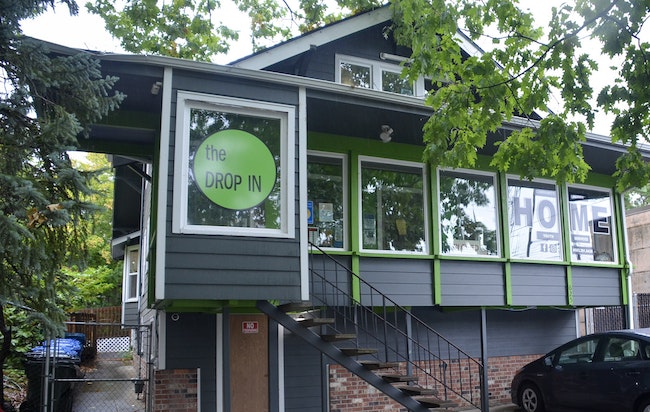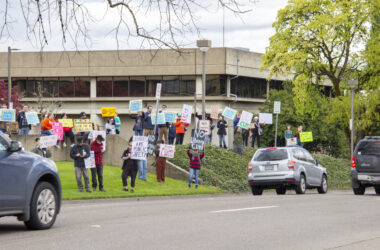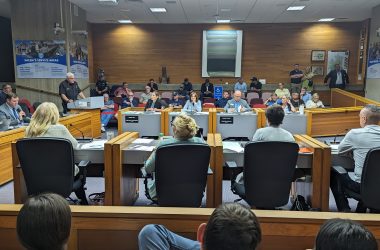When Salem’s youth shelter, Taylor’s House, opened its doors, one teen was already sleeping on the porch.
The need for a youth shelter in the area was so great that a young person from rural Polk County made the journey into Salem and was waiting for the shelter to open, said Ashley Hamilton, director of the ARCHES Project. The agency operates the shelter, which opened in December 2018.
“They were so in need of that service,” she said.
Now, ARCHES is working to bring more services to homeless young people in rural Polk County so they don’t have to travel to Salem to get help.
ARCHES’ parent agency, the Mid-Willamette Valley Community Action Agency, recently landed money to open a similar shelter in Polk County and bring more services directly to young people without housing.
The effort is part of a larger grant the Mid-Willamette Valley Homeless Alliance received last year from the federal Department of Housing and Urban Development to address youth homelessness in the region.
The $3.7 million grant paid for a six-month process to assess needs for serving homeless youth in the region, which resulted in a plan published in March for ending youth homelessness in Marion and Polk counties. The grant also provided funding for two years for demonstration projects intended to help tackle the problem.
“This is like our biggest concerted effort to work on youth homelessness ever in our region, which is really exciting,” said Chris Hoy, Salem City Council president, who serves as the vice chair for the homeless alliance board.
The board awarded grants in June to Community Action and Church at the Park for a total of four projects intended to help young people.
Community Action received three separate grants for programs totaling about $3 million over two years, according to a project list.
The largest, Hamilton said, will go toward opening a youth shelter similar to Taylor’s House in Polk County. She said the agency hasn’t chosen a site yet, but the shelter would be outside of Salem.
“We know that Polk County, and especially rural Polk County has some of the highest rates of youth homelessness in the state,” she said, based on homeless student data reported to the Oregon Department of Education.
The shelter would serve people ages 14-18, with space for eight to 10 at one time. The goal would be to provide temporary housing while helping teens secure their own apartment, with funds available to initially subsidize rent and help with deposit and other upfront costs.
“We would kind of pay their rent as we’re leading them and guiding them to adulthood,” she said.
Another grant would be used for outreach services in Polk County. Currently, outreach workers try to get to communities like Dallas and Independence once or twice a week, but there’s no permanent location with regular hours where homeless young people can get help without going into Salem, said Alisa Tobin, who runs youth programs for ARCHES.
“A lot of our youth don’t have access to cars. They’re either under 16 or don’t have the means to get a license, or beyond that get a car to provide that transportation,” she said.
Finally, the agency wants to create a new coordinated entry system specifically for young people. Coordinated entry is a tool used by homeless service providers to collect data on clients and their needs, like whether they have a disability, a substance abuse problem or are veterans. Data is shared between agencies and helps identify who may be eligible for a particular program, or how vulnerable someone is to continued homelessness.
But Hamilton said existing tools for adults do a poor job of capturing the needs of young people.
Often, housing or other assistance is targeted toward people who are “chronically homeless,” meaning they’ve spent a certain number of years without housing. Young people usually can’t qualify because they haven’t been alive long enough, even if they’re acutely in need of help.
“It actually impacts their eligibility into services because they’re not deemed the most vulnerable,” Hamilton said.
A fourth grant for Church at the Park will help fund operations for a new micro shelter site at the church’s property on Southeast Turner Road specifically for young people. That’s expected to open by December.
The grant awarding process initially had some conflict between members of the youth board, Backbone, who have experience being homeless, and the adult board members of the Mid-Willamette Valley Homeless Alliance.
The youth group helped craft the region’s plan for addressing youth homelessness which led to the federal grant and advised the alliance board on ranking and scoring projects that applied for money.
The final project list included the top projects youth members supported, but the amounts of funding didn’t match the order the youth recommended prioritizing the projects, said Marianne Bradshaw, who’s overseeing the grant process for the homeless alliance.
That led to many youth members feeling like their input and voices weren’t being heard, she said. After raising the issue with the adult board members, Bradshaw said the group apologized and committed to doing better as the projects progress.
“We know we didn’t provide time to fully listen to you and our actions didn’t demonstrate that we value your voice or the lived experiences you bring to the process. For that, please accept our sincere apology,” the board members wrote in a collective letter dated July 18.
“The way things went down in June did not reflect our values and I feel like most people are looking back at that and saying we should have done better,” Bradshaw said.
Hoy said he’s learned a lot from the young people during the process about the unique challenges they face, like being unwelcome in encampments because of fears police or child protective services will come looking for them.
“They face harassment and discrimination from the adults just because they’re viewed as a problem … just their very existence creates hostility,” he said.
Bradshaw said she and the youth board members are excited to see the projects move forward.
“All four of these projects are outstanding projects,” she said.
Contact reporter Rachel Alexander: [email protected] or 503-575-1241.
JUST THE FACTS, FOR SALEM – We report on your community with care and depth, fairness and accuracy. Get local news that matters to you. Subscribe to Salem Reporter starting at $5 a month. Click I want to subscribe!

Rachel Alexander is Salem Reporter’s managing editor. She joined Salem Reporter when it was founded in 2018 and covers city news, education, nonprofits and a little bit of everything else. She’s been a journalist in Oregon and Washington for a decade. Outside of work, she’s a skater and board member with Salem’s Cherry City Roller Derby and can often be found with her nose buried in a book.









